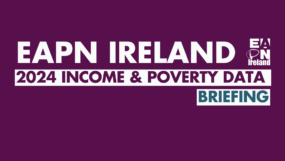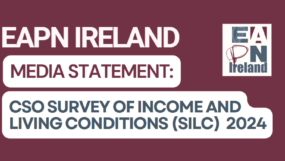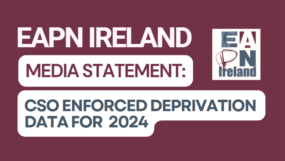EAPN Ireland Budget Statement 2023

The European Anti-Poverty Network (EAPN) Ireland has welcomed Government announcements made today as part of Budget 2023; however, the network believes that the range of adhoc and once off measures announced today will not address the root causes of poverty for low-income households in the long term or mitigate the ongoing negative impacts of inflation as it continues to rise for the foreseeable future.
Announcements made as part of Budget 2023 include:
- A €12 increase to core welfare payments
- Childcare fees to be reduced by 25%
- Free school books at primary school level
- A €500 payment for carers
- Once off Double payment of SUSI grant
- Free contraception scheme to be extended up to and including 30 year olds
- Hospital inpatient charges to be scrapped
Paul Ginnell Director of EAPN Ireland states: “We welcome announcements that have been made today, that will have a positive impact for households, including increases to social welfare rates and initiatives such as the State taking responsibility for the provision of free schoolbooks at primary level. However, we are disappointed that the Government has not taken the opportunity to address the cost of living, poverty, and deprivation through a commitment to income adequacy, that would help address inequality in a long- term capacity. The increase to social welfare, for example, is well below the call from the Community and Voluntary sector for €20 increase, that would merely facilitate households to stand still again rising inflation. Instead, we have a €12 increase, which does nothing to reduce the struggles that people living in poverty are facing due to the increasing living costs”
He continues- “Poverty costs the state billions every year and cannot be solved by once off and ad hoc payments and schemes, which do not address the underlying structural and systematic causes of social exclusion. If we have any chance of meeting the Anti-Poverty commitments Ireland has signed up to, the Government must commit on a policy level to income adequacy, via the bench marking of social welfare to a Minimum Essential Standard of living and accessible public services, delivered by long term investment and progressive realisation over the course of several budgets. It is disappointing that the Government’s approach to rising living costs and the struggles facing low-income households are so short sighted when the negative impacts of poverty will cause the state and society significantly more in the long run.”
Notes:
- The Minimum Essential Standard of Living is based upon annual research conducted by the Vincentian Partnership for Social Justice which represents the basket of goods and services required by households in order to meet their minimum physical social and psychological needs and achieve a socially acceptable standard of living. You can read more
- In 2021, 11.6% of the population were living below the poverty line (or were at risk-of poverty) as they had an income that was less than 60% of the median disposable income, so €15,158 per annum or €290.49 per week, an increase of €18.26 from 2020. This is over 581,000 people. You can read more here.
Recent posts
- EAPN Ireland is hiring an Administration and Finance Officer
- EAPN Ireland Briefing: 2024 Income and Poverty Data
- URGENT ACTION NEEDED FROM GOVERNMENT AS LATEST DATA SHOWS POVERTY INCREASED IN 2024
- Fall in Deprivation in 2024 welcome, but is still the reality for almost 830,000 people
- SOCIAL INCLUSION FORUM 2025 – CWI/EAPN Ireland Preparatory Workshops






